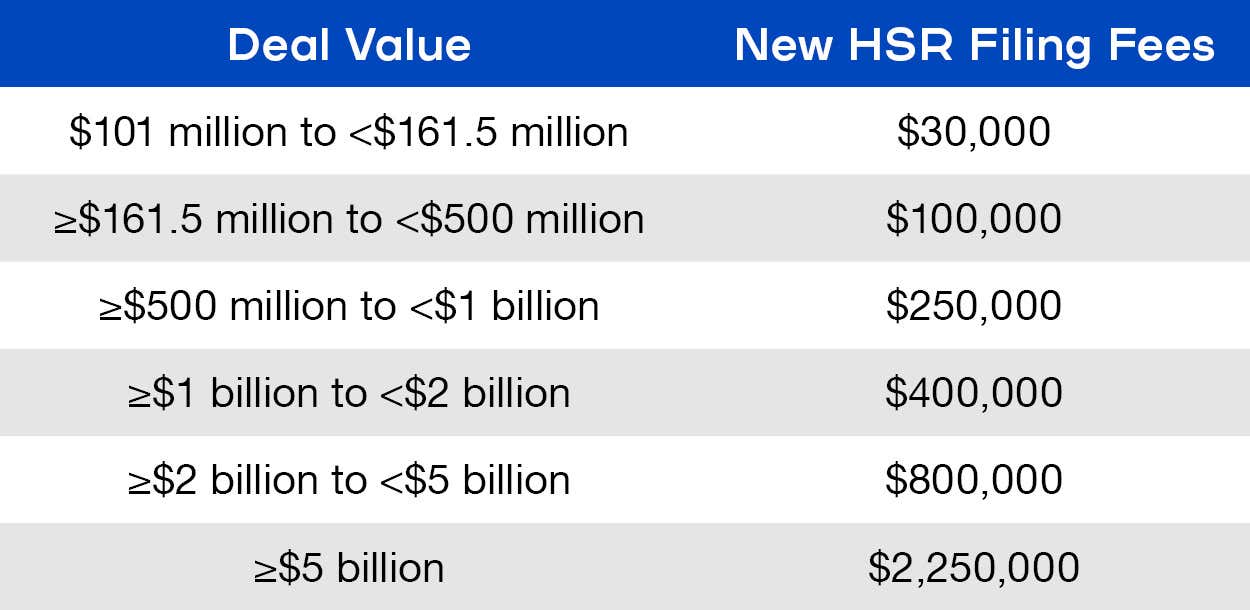Congress Increases Merger Filing Fees for Large Deals and Makes Other Significant Changes
Congress passed the Consolidated Appropriations Act of 2023 (the “Act”) on December 22, 2022, and President Biden signed it into law on December 29, 2022. The Act significantly amends the Hart-Scott-Rodino Act (the “HSR Act”)[1] by increasing the filing fees for most transactions, with significant increases for mergers valued at over $1 billion, and generally decreasing fees for transactions valued at less than $500 million. The Act also makes other important changes, including: (1) requiring disclosure of certain foreign subsidies, (2) increasing the annual operating budgets of the Federal Trade Commission (FTC) and Department of Justice Antitrust Division (DOJ), and (3) giving state attorneys general (“State AGs”) authority to avoid consolidation as part of a multidistrict litigation (MDL) process for civil antitrust cases.
New Filing Fees
Under the HSR Act, parties to a merger or acquisition exceeding certain thresholds[2] must notify the FTC and DOJ of the transaction, pay the appropriate filing fees, and observe a statutory waiting period for the agencies to complete their review of the transaction. Although merger filing fees are usually adjusted at the beginning of each calendar year, the Act significantly increases the filing fees for transactions valued at over $1 billion and decreases merger filing fees for most transactions valued below $500 million. Both the HSR filing thresholds and HSR filing fees are tied to inflation but are benchmarked to different measures. The Act allows the agencies to adjust filing fees annually by an amount equal to the percentage increase in the Consumer Price Index, as determined by the Department of Labor, whereas the HSR filing thresholds are adjusted annually based on the change in gross national product.
Under the Act, the filing fees are amended as follows:

The new filing fees are expected to go into effect in 2023 and will be reflected on the FTC’s Premerger Notification Office website.[3]
“Foreign Entities of Concern”
The Act requires merging parties to disclose subsidies from certain “foreign entities of concern.”[4] These include, but are not limited to, entities controlled by China, Iran, North Korea, Russia, and other entities included on the Specially Designated Nationals and Blocked Persons List (SDN). The bill requires the FTC to issue a rulemaking on this requirement along with concurrences from the DOJ’s assistant attorney general, the chairperson of the Committee on Foreign Investment in the United States, and the heads of other appropriate agencies. The agencies will also need to determine the information companies are required to disclose in their HSR Act filings.
Increase in Antitrust Enforcement Budgets
The Act significantly increases funding for the FTC and DOJ. The FTC’s budget will increase from $379 million to $430 million, and the DOJ’s budget will increase from $193 million to $225 million. More funding for the FTC and DOJ will likely result in additional hiring and increased antitrust enforcement.
State Antitrust Enforcers Retain Home Venue
The Act amends 28 U.S. Code § 1407(g) concerning multidistrict litigation to allow State AGs to select the jurisdiction to bring antitrust suits. This modification provides state-enforced actions with the same jurisdictional choice as federally enforced actions. Previously, through the MDL process, State AGs’ antitrust lawsuits were often consolidated with other private actions by companies and individuals in one judicial district for pretrial purposes. The Act eliminated 28 U.S. Code § 1407(h), therefore a State AG can keep an antitrust lawsuit in its favored original venue even if there is an active MDL. This may increase the litigation burden on companies by forcing them to defend lawsuits in multiple jurisdictions. The Act does not change, modify, or eliminate personal jurisdiction and venue requirements.
Key Takeaways
- The merger filing fees have generally increased, especially for transactions valued at over $1 billion.
- Companies will be required to disclose subsidies from foreign entities of concern; an FTC rulemaking procedure will provide more details.
- State AGs can avoid consolidation in the MDL process for any antitrust lawsuits they bring.
- The FTC and DOJ will receive additional funding.
[1] 15 U.S.C. § 18a.
[2] For more information on the thresholds, please see MoFo’s client alert, FTC Announces New Increased HSR Filing Thresholds for 2022.
[3] Filing Fee Information, Fed. Trade Comm’n Premerger Notification Program.
[4] The Act states that a “foreign entity of concern” is an entity defined in 42 U.S.C. § 18741(a)(5).
 Alexander OkuliarCo-chair Global Antitrust Law Practice Group
Alexander OkuliarCo-chair Global Antitrust Law Practice Group Megan E. GerkingPartner
Megan E. GerkingPartner Kevin WangAssociate
Kevin WangAssociate
Practices